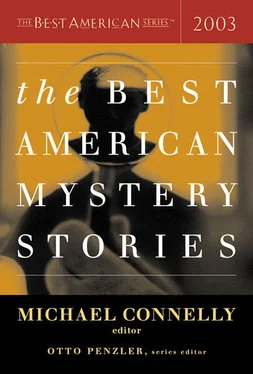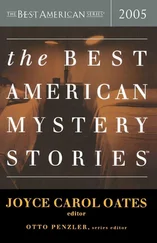And then? They no longer looked back on this season as the autumn when they lost their second child. This season — with its gentle temperatures and propensity for inspiring flight — they recalled instead as that one autumn when those awful people, that terrible pair, broke into the cabin. They exchanged one memory for the other, remembering Ernie’s raging, man-sized sobs as he worked at the stiff rawhide, remembering him rocking her under a shaft of moonlight that sliced through the door he’d left open, remembering, half laughing, that the first thing Marie wanted to do, after being rescued by her prince, was pee. This moment became the turning point — this moment and no other — when two long-married people decided to stay married, to succumb to the shape of the rest of their life, to live with things they would not speak of. They shouldered each other into the coming years because there was no other face each could bear to look at in this moment of turning, no other arms they could bear but each other’s, and they made themselves right again, they did, just the two of them.
Born and raised in northern Michigan, Doug Allynstudied the Chinese language at Indiana University and served in Southeast Asia during the Vietnam War.
Returning to school on the GI Bill, Allyn studied creative writing and criminal psychology at the University of Michigan while moonlighting as a guitarist and a poet and lyricist in the rock group Devil’s Triangle. He later taught creative writing at Mott Community College and presently reviews books for the Flint Journal while maintaining a full writing schedule.
From the beginning, critical response to Mr. Allyn’s work has been remarkable. His first published story won the Robert L. Fish award from the Mystery Writers of America. Subsequent works have won the Edgar Allan Poe Award, the American Mystery Award, the Derringer Award for best novella, and the Ellery Queen Readers’ Award five times. His career highlights include drinking champagne with Mickey Spillane and waltzing with Mary Higgins Clark. The Allyns live in frenetic bliss in Montrose, Michigan.
“The Jukebox King” is based on the reality of the Detroit nightclub scene. Rap didn’t introduce gangsters to the music business; the Mob has been in the game since Prohibition. Drawn to the nightlife and easy money, hoods had financial interests in dance clubs, jukeboxes, and even recording studios.
This wasn’t necessarily a negative. Some very bad guys had very good taste. But as rhythm and blues began evolving into rock ‘n’ roll, even the Mafia developed a generation gap.
Christopher Chamberswas born in Madison, Wisconsin, and has since lived in North Carolina, Michigan, Minnesota, Florida, Alabama, and Louisiana. He received a degree in English at the University of Wisconsin at River Falls in 1984, and over the following ten years worked as a salesman, bus driver, meat cutter, farmhand, carpenter, journalist, photographer, bartender, dockworker, lifeguard, screenwriter, and editor. He taught martial arts in Minneapolis, high school physical education in South Florida, and writing at the University of Alabama, where he received an M.F.A. degree. His work has appeared in such journals as the Gettysburg Review, Washington Square, Hayden’s Ferry Review, Quarter After Eight, Notre Dame Review, Exquisite Corpse, Controlled Burn, Quarterly West, and the Carolina Quarterly. His short story collection, Aardvark to Aztec, was short-listed for the Mary McCarthy Prize. His short fiction has received four Pushcart Prize nominations, the Scott and Zelda Fitzgerald Literary Award for Short Fiction, and is included in the recent anthology French Quarter Fiction: The Newest Stories from America’s Oldest Bohemia. He lives in New Orleans, where he teaches at Loyola University.
“Aardvark to Aztec” was written on an old Royal portable, in the summer, as I recall. I was living in a cabin outside Tuscaloosa, Alabama. I dragged a wooden table onto the porch that overlooked a ravine that was overgrown and unremarkable most of the time, but became unexpectedly beautiful each spring with an abundance of dogwood blossoms, and on those summer nights when fireflies lit up like a distant metropolis. It was on one of these nights, on that porch, sitting at my typewriter, to a chorus of nocturnal insects, that I tapped out the first sentence. The writing began with the character of Miranda and her vague discontent, so I guess it should have been no surprise for me to discover in the end that it is indeed her story. The clown, like much of the story, came out of nowhere. There may have been a small glass of whiskey, and an inexpensive cigar on the table as well. Perhaps strains of Hank Williams drifting out through the screen door, the drone of the firefly beyond the ravine. I realized quickly that someone was going to die in this story. I didn’t know who, but it saddened me, because I was already coming to grow fond of each of these characters.
Christopher Cooklives in Prague, Czech Republic. He previously lived in France and Mexico but grew up in East Texas, the Bible-thumping South. The persistent pounding spurred escape and his incurable nomadism.
Cook decided early to become a writer but soon discovered he didn’t know how. To learn, he became a daily newspaper reporter in several southern states of disrepair. Odious bosses caused him to pursue subsequent work as a trade union activist. He later fell into a U.S. think tank, where he thought a lot and recognized that smart public policy is difficult to incite, almost impossible. Writing became his private refuge. Otherwise his life has been ordinary. There are unaccountable gaps in his biography.
Cook’s award-winning novel, Robbers (2000), was published in the United States and abroad, as was his second book, Screen Door Jesus & Other Stones (2001). He is completing a third book.
While living in Paris, and commuting on the underground Métro, I often wished for something interesting to happen, anything at all. Having my pocket picked, for example. Even better, seeing another’s pocket picked. Best yet, what if I became a pickpocket? I noodled the idea. But a jail cell is more boring than the subway. So I decided to become one in a story instead.
“The Pickpocket,” quickly completed, was eagerly rejected without comment by numerous magazines and literary journals in the U.S.A. In France, however, it won first prize in a literary contest sponsored by the Sorbonne University and Transcontinental Paris. That was 1995. It was finally published stateside in the Dennis McMillan anthology Measures of Poison (2002) after a biblical period in exile.
John Peyton Cookewas born in Amarillo, Texas, and grew up in Laramie, Wyoming. He is the author of five novels and several short stories and has collected the typical writer’s resume of odd jobs: literary book shelver, data entry operator, office assistant at the American Institute of History of Pharmacy, and police report typist with the Madison (Wisc.) Police Department. His current, and oddest, job is as editorial director of a medical communications agency in New York City. He lives in Ketonah, New York, with his partner, Keng, and their two dogs: Ricky, a toy poodle and petty thief; and Quilty, a whippet and occasional poet.
I would like to dedicate this appearance of “After You’ve Gone” to the memory of my father, William Peyton Cooke, author of mystery novels The Nemesis Conjecture and Orion’s Shroud, who died on January 16, 2003, in Amarillo, Texas. When I asked him what he thought of this story, he said, “I liked it. But of course I knew all along how it was going to end.” There is nothing like a father to keep egging you on to do better.
Читать дальше












